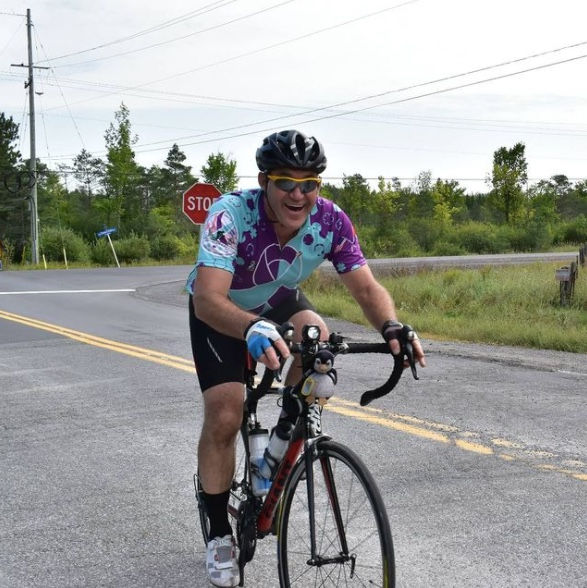Solving problems, one step at a time.

I met Robert on the 102 kilometer-long bike ride that marked the end of the First Responders Are Human 2021 campaign (also my first 100+ km ride ever). The exhausting (but not grueling) ride was punctuated from time to time by interruptions for lunch or for the group the poke fun at the rookie (me). One thing I learned that day about long distance riding culture is that managing the trifecta of a blown tire, falling off the bike, and having calves covered in chain grease is something of a rite of passage.
Speaking with each other periodically throughout the ride in one of those long wandering conversations without really a starting or ending point, I quickly developed an impression of Robert as a quiet, reliable individual who just wants to help - to be there for others. He doesn't focus on making a big glorious splash but rather on the small impacts he can make, and in so doing he has made differences in the lives people around the world. He certainly left a lasting impression on me.
Because of his experience in the field, overseas, and as a teacher/mentor, there are perhaps few better suited than Robert to offer commentary on the state of mental health in Paramedicine. Speaking with him, then, became the next logical step in writing a new set of stories for this spotlight series.

Since his adolescence when he took charge of caring for his ailing grandfather, Robert sought to help people however he could. “When [my] grandpa was sick and he came to stay at home, I spoke with my dad about what could go wrong especially since [where we lived] there was no ambulance service like there is today. We decided that I would start taking first aid courses so if anything happened, I would be prepared.”
This exposure to the medical field spoke powerfully to him and, finding that first aid courses didn’t teach him everything he needed to know, he dove headfirst into the medical field. “Since being a doctor didn’t work out, when my first aid instructor introduced me to Paramedicine as a career, I took that path”.
Robert landed his first paramedic job in the late 70’s and as the service grew, he moved into the role of advanced care paramedic to respond to the need for higher levels of care in his area. Then, seeing an opportunity to teach his skills to a new generation, he accepted a role at the local college and added to his pedigree by taking on a training mission to Lebanon in the early 2000’s that lasted 1 month every year.
A valiant, though perhaps doomed effort, the Lebanon project was cancelled after 5 years; just another victim of recurrent civil conflict that plagues the Middle East. How can a sustainable program be built when militiamen walk unopposed into hospitals and gun down opponents in their beds? To hear Robert talk about it, you’d think that it was all for naught.
But there is a silver lining: Ziad, (one of Robert’s students) applied what he learned in his small patient transfer business. He later became successful enough to send his two sons to school in Canada, one of whom, Mohamad, is becoming a paramedic in his own right. Robert won’t take any credit for the success of the business, nor for helping to pave the way for Mohamad to become a medic, but I can’t help but think that at least some of this success can be traced back to him.
This is what can happen when you focus on helping, however you can, even in the smallest of ways.

Robert’s next engagement is to close the gap in mental health training for paramedics. Years of experience in the field allowed him to develop a 3-part strategy for new medics:
1) Build a sense of self outside of your career,
2) Understand what you signed up for, and
3) Have a plan B.
If this sounds like Jordan Bickmore’s ideas, it’s probably because great minds think alike.
Robert agrees that building a support web comprising a deep understanding of oneself, and a strong friend and family ecosystem, is important for people in highly stressful careers.
He will point out further though, that not everyone will stay in paramedicine for life. If the time comes several years into your career where you decide that for whatever reason you must leave, then having built that support web as well as extra skills and a plan B is what keeps one’s head above water.
It’s important to mention this because over his years as a practitioner and teacher, he’s noted that many will get disillusioned with the day-to-day life of a paramedic. Those who sign up to be a hero or to bask in some glory become disappointed as most of the calls tend not to fall into the “heroic” category.
However, he points out that though a call may not seem significant or heroic to you, it just might be to someone else. It’s about helping in whatever way you can. “There may be little wrong physically with the patient… or then again there may be a lot wrong with them. In either case, even just transmitting the thought that you’re there for them can do worlds of good”.
Remembering that the job is about making whatever small difference you can, who knows how big of a help that will turn out to be to the person who needs it? Pursuing a career path of helping in smallest ways can sometimes have the biggest impact, but it’s not a path to be taken alone.

Comments